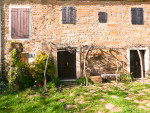Garbage collection in France
Nathalie Corbin, Saturday, 18 September 2021

In most villages in the French countryside, the waste is collected once a week. You can put the trash on the road, for example at the driveway of your home or the beginning of the path towards your home. Or you have to bring the garbage to a collection point, the so-called poubelles. The poubelles stand in strategic places around the village. Don’t put the trash too early on the road because it will attract pests. A local tax usually charges the collection of the garbage.
In French villages, there are often recycling bins, for example for glass and plastic. You can also find them at supermarkets. In the car park of a French supermarket, you can also find a waste separation boxes for old paper and used clothes.
You can usually burn your garden waste yourself if you don't cause any inconvenience. If the neighbors live close, you have to ask it for permission first. In the countryside, you can’t make a fire in the summer. Due to the drought, it is too dangerous. There can be a few sparks, and before you know, you have a big fire. Go to the town hall for local regulations.
Rubbish can be delivered at the local waste collection (déchetterie). The déchetterie is open a few mornings a week. At the entrance of a déchetterie you will find a list with allowed objects. You'll also find traders who are interested in coarse dirt. You can not deliver hazardous waste. here. Ask the town hall what to do with chemical waste like print cartridges or chemicals. Medicines that you no longer use, or which are past the past the sell-by date, can be handed in at the local pharmacy.

In most villages in the French countryside, the waste is collected once a week. You can put the trash on the road, for example at the driveway of your home or the beginning of the path towards your home. Or you have to bring the garbage to a collection point, the so-called poubelles. The poubelles stand in strategic places around the village. Don’t put the trash too early on the road because it will attract pests. A local tax usually charges the collection of the garbage.
In French villages, there are often recycling bins, for example for glass and plastic. You can also find them at supermarkets. In the car park of a French supermarket, you can also find a waste separation boxes for old paper and used clothes.
You can usually burn your garden waste yourself if you don't cause any inconvenience. If the neighbors live close, you have to ask it for permission first. In the countryside, you can’t make a fire in the summer. Due to the drought, it is too dangerous. There can be a few sparks, and before you know, you have a big fire. Go to the town hall for local regulations.
Rubbish can be delivered at the local waste collection (déchetterie). The déchetterie is open a few mornings a week. At the entrance of a déchetterie you will find a list with allowed objects. You'll also find traders who are interested in coarse dirt. You can not deliver hazardous waste. here. Ask the town hall what to do with chemical waste like print cartridges or chemicals. Medicines that you no longer use, or which are past the past the sell-by date, can be handed in at the local pharmacy.

Search for French property and real estate for sale in all regions of France. Fermettes, gites, houses, B&B’s for sale by owner. Houses for sale in Gironde, Dordogne, Landes, Calvados, Manche and Orne
 Owning a castle in France is a dream with high costs. Annual maintenance is 1-1.5% of the value. Restoration and staff costs are significant. Taxes and
insurance add expenses. Subsidies and tax benefits help but often require public access. A detailed financial plan is crucial for enjoying your dream
castle without surprises. Proper preparation ensures a rewarding experience.
Owning a castle in France is a dream with high costs. Annual maintenance is 1-1.5% of the value. Restoration and staff costs are significant. Taxes and
insurance add expenses. Subsidies and tax benefits help but often require public access. A detailed financial plan is crucial for enjoying your dream
castle without surprises. Proper preparation ensures a rewarding experience.